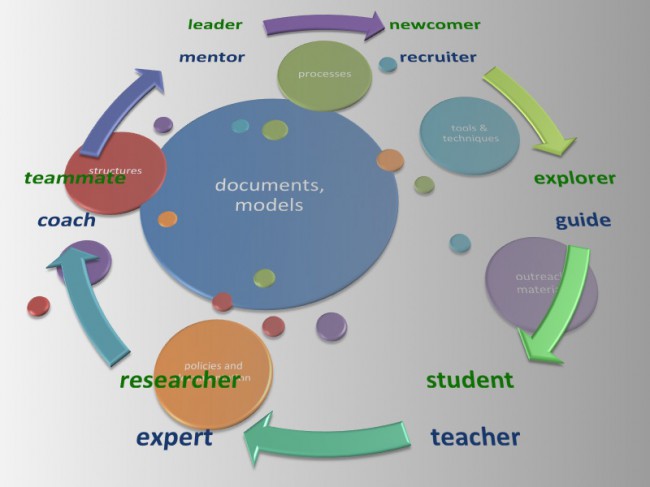 I do these scratch-pad posts for really narrow audiences, the rest of you will find them a bit bewildering. Sorry about that. This one is aimed at the GNSO Council, as we ponder the question “how do we increase the pool of PDP working-group volunteers?”
I do these scratch-pad posts for really narrow audiences, the rest of you will find them a bit bewildering. Sorry about that. This one is aimed at the GNSO Council, as we ponder the question “how do we increase the pool of PDP working-group volunteers?”
Broadening the bottom of the bottom-up process is a critical need at ICANN right now. But at least in the part of ICANN where I live (GNSO policy-making working groups) the conversations that take place are very nuanced and do require a good deal of background and experience before a person is going to be an effective contributor to the conversation.
So I think that we/ICANN need to develop a clearer understanding of the many different roles that people play as they progress toward becoming an effective participant in the process. And then put the resources and process in place to encourage them along the way.
Roles
Here’s a starter-kit list of roles that people play. I’m putting them in pairs because nobody can do this by themselves — we all need the help of others as we progress. I’ve also built a little drawing which puts these in a never ending circle because we’re always turning back into newcomers as we explore another facet of the organization. I decided to beat the term “translation” to death in these descriptions. I think ICANN needs to “translate” what it does for a wide range of audiences to make it easier for them to participate.
Newcomer <-> Recruiter
A newcomer is likely to be just as bewildered by that experience as most of the rest of us have been. They need a “recruiter” greet them, welcome them into the flow, translate what’s going on into terms they can understand, find out what their interests and goals are and get them introduced to a few “guides” who can take them to the next step.
Explorer <-> Guide
As the newcomer finds their place, they will want to explore information and conversations that are relevant to their interests and they need a “guide” to call on to translate their questions into pointers toward information or people that they’re trying to find.
Student <-> Teacher
As the person progresses they need a positive, low-risk way to learn the skills and knowledge they need in order to be able to contribute. And, like any student, they need a teacher or two. I’ve always thought that we are missing a huge opportunity in the GNSO Constituencies by not consciously using the process of preparing public comments as a place for less experienced members to develop their policy-making skills in a more intimate, less risky environment than a full-blown working-group. I’d love to see newer members of Constituencies consciously brought into progressively richer roles in the teams that write public comments for Constituencies.
Researcher <-> Expert
Another person who needs a very specific kind of partner is a person who comes to ICANN to research — either to find an answer to a policy-related question, find the best way to handle a problem or complaint that they have with a provider, or to discover whether there is data within the ICANN community that can help with formal academic research. Again, here is a person with fairly clear questions who needs help sifting and sorting through all the information that’s available here — another form of translation, this time provided by a librarian or an “expert” in my taxonomy. This person may not want to build new skills, they’re just here for answers. But filling that “expert” role could be a great opportunity for somebody who’s already here.
Teammate <-> Coach
A person who is experiencing a policy-making drafting-team (e.g. within a constituency) or working group for the first few times has a lot of things to learn, and many of those things aren’t obvious right at the start. And this person may not feel comfortable asking questions of the whole group for a wide variety of reasons. They would benefit from a “coach” — a person who makes it clear that they are available to answer *any* question, no matter how small. This person is translating a sometimes-mysterious team process for a teammate who is learning the ropes.
Leader <-> Mentor
As our person progresses, they eventually take up a leadership role, and once again could use the help of others to navigate new duties — yet another form of translation, this time delivered by a mentor who helps the emerging leader be effective in their chosen role.
Information
I also think there are all kinds of information assets that participants use and access in different ways depending on what their role is at the moment. Another kind of translation! 🙂 Here’s another starter-kit list:
- Organizational structures
- Documents
- Transcripts
- Email archives
- Models
- Processes
- Tools and techniques
- Outreach materials
I think there’s a gigantic opportunity to make this “career progression” and “information discovery” easier and more available to people wanting to participate at the bottom of the bottom-up process. I’m not sure that there’s much need for new technology to do all this — my thoughts run more toward setting goals, rewarding people who help, etc. But a dab of cool tech here and there might help…
